De Nederlandse dichter, schrijver, songwriter en vertaler Pé Hawinkels werd geboren op 29 september 1942 in Heerlen. Zie ook mijn blog van 29 september 2010 en eveneens alle tags voor Pé Hawinkels op dit blog
Perceptie
In de winter, toen mijn gezicht reeds de vormen aannam
van een masker der Azteken, en er wormen, kort als koren,
in mijn oren, zich wiegden, heen, weer, zachtjes been en weer,
trad er uit het duister een naar voren, als nit plooien
van een zwarte gladiool. Het was to laat.
En, ogen, to jong. Kraakbeen in een zak van ’t meest precieuze
perkament dat ooit verspild is aan een dicht der domheid:
een wezenslichaam, bedrieglijk bewegend in zijn gang,
zo zachtjes been en weer als de trieste allerteerste
gebaren waarmee je een borst kunt strelen. En verspreid
de stille stuipen van puistjes, tekens van een sluimerende val.
Wie toch zou er weten waaromheen de broze lippen
beslagen, en als damp zich voegend, en aanslag, weke, zo warme
zich cirkelen?
Gedachten gaan als zagen hun gang,
En – ongelukkig als een koning – wordt de rijst
to zwaar betaald, en komt je het’vertrappen
van tastbare heiligheid duur to staan: –
al ben je dan een god van over zee
je aureool bestaat uit louter lellen –
omwille van de knoken van een kind.
En de steep die barstte, ach, in spreken uit
– zij lichtten, o, zij lachten – met een stem
waarin lets kapseisde. Ernst. Beschamend bewijsstuk.
Nat zijn de straten rond mijn reis. Wat wil ik?
Tranen als olie, straf, verlangen naar straf.
Het gebeente, het geknekelte van bomen, reumatisch
en geborneerd vadert, de laatste, om die actie.
‘1k geloof alles wat je zegt.’ Dat overleefde ik
en plaatste met weemoed dit bewijs van wonderen,
van onverdiende bloei, die opschoot in mijn spoor,
mij, achteloos, en daarom op de plaatsen die men overslaan
zou moeten… een bijziend zwijn, en appels in de modder.
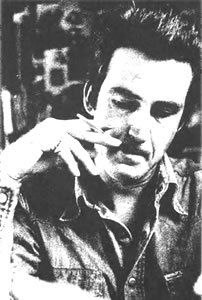
Pé Hawinkels (29 september 1942 – 16 augustus 1977)
De Bulgaarse dichter en schrijver Hristo Smirnenski werd geboren op 29 september 1898 in Koukoush. Zie ook mijn blog van 29 september 2010 en eveneens alle tags voor Hristo Smirnenski op dit blog.
Coalminer
Go down and deeper down, down!
Go down into the chilly pit,
Where shining bodies writhe and pound
Upon a wall by blackness lit –
A life of toil in darkness drowned,
Suffocating and unholy lands.
In twisting tunnels blows resound
Of picks held firm by sinewy hands,
They ring in protest and in hope
For open skies and sunny days,
Go down and deeper down, down!
into spaceless space.
Go down into the lightless womb
Of rapacious mother Earth,
Where men are doomed to constant gloom,
Deprived of their human worth
And the glimmer of your lamp
Will light this temple of toil,
Sinister rugged and damp,
Build of props, black stone and simple soil.
There monster idols twitch and frown
Upon the worshippers of dayless time.
Go down and deeper down, down!
into a climeless clime.
Here the countless years have piled
Layers upon layers of black
And stony rugs of patterns wild,
Boundless Nature’s bounty stack
of power locked in smoke and flame,
Rough and cold like human pain.
Go down to this fountain of shame,
Of hope and despair, of sweat and gain.
Go down along the narrow track,
And storm the dark abysmal caves
To break the layers thick and black
and the chains of slaves.
Shove the shining mass of coal
Into the raging furnace of the fight,
And out of the leaden clouds will roll
An ever-flowing river bright,
Luminous streams and waves of fire
Rushing through the weary night,
In fury and rightful ire,
The Earth will bathe with joyous flares,
With rainbow-coloured blazing arks,
With flaming fires every where,
and myriads of sparks.
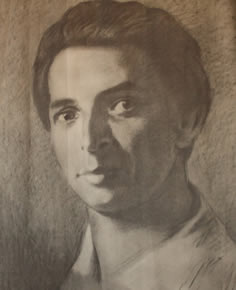
Hristo Smirnenski (29 september 1898 – 18 juni 1923)
De Britse schrijfster Elizabeth Gaskell werd geboren op 29 september 1810 in Londen. Zie ook mijn blog van 29 september 2010 en eveneens alle tags voor Eilzabeth Gaskel op dit blog.
Uit: Ruth
“The inhospitable houses projected their flights of steps almost into the carriage-way, forcing pedestrians again into the danger they had avoided for twenty or thirty paces. Then, at night, the only light was derived from the glaring, flaring oil-lamps, hung above the doors of the more aristocratic mansions; just allowing space for the passers-by to become visible, before they again disappeared into the darkness, where it was no uncommon thing for robbers to be in waiting for their prey.
The traditions of those bygone times, even to the smallest social particular, enable one to understand more clearly the circumstances which contributed to the formation of character. The daily life into which people are born, and into which they are absorbed before they are well aware, forms chains which only one in a hundred has moral strength enough to despise, and to break when the right time comes–when an inward necessity for independent individual action arises, which is superior to all outward conventionalities. Therefore, it is well to know what were the chains of daily domestic habit, which were the natural leading strings of our forefathers before they learnt to go alone.
The picturesqueness of those ancient streets has departed now. The Astleys, the Dunstans, the Waverhams–names of power in that district–go up duly to London in the season, and have sold their residences in the county town fifty years ago, or more. And when the county town lost its attraction for the Astleys, the Dunstans, the Waverhams, how could it be supposed that the Domvilles, the Bextons, and the Wildes would continue to go and winter there in their second-rate houses, and with their increased expenditure? So the grand old houses stood empty awhile; and then speculators ventured to purchase, and to turn the deserted mansions into many smaller dwellings, fitted for professional men, or even (bend your ear lower, lest the shade of Marmaduke, first Baron Waverham, hear) into shops!”
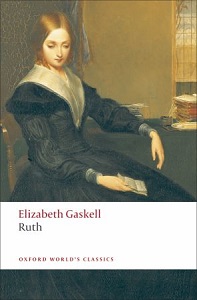
Elizabeth Gaskell (29 september 1810 – 12 november 1865)
Cover
De Spaanse dichter en filosoof Miguel de Unamuno y Jugo werd geboren op 29 september 1864 in Bilbao. Zie ook mijn blog van 29 september 2010 en eveneens alle tags voor Miguel de Unamuno y Jugo op dit blog.
Uit: Pladoyer des Müßiggangs
„Bei meinem letzten Aufenthalt in Portugal, zur heißesten Tageszeit, als sich die Trägheit meines Körpers und meiner seele bemächtigte. vertrieb ich mir die Zeit damit, aufs Bett hingestreckt langsam Lord Byron zu lesen. Von Zeit zu Zeit lieB ich das Buch sinken, um nachzudenken?, nein, urn rnir allerhand Luftschlösserzusammenzuphantasieren.
Zuweilen raffte ich mich dazu auf, an den Balkon zu treten, um einen Augenblick lang das Meer zu betrachten, das da träge am strand ausgestreckt lag. Und das Gluckern des Ozeans, vermischt mit den Echos von Lord Byron, der diesen so sehr geliebt hatte, half mir, weiterhin Dinge ohne festen Umrilz und Substanz zusammenzuphantasieren. ln meinem Geist herrschte eine poetische, das heiß aber schopferische Situation, welche die Trägheit hervorruft Denn der Dichter ist zu allererst ein Faulenzer, ein Nichtstuer, und das sage ich zum Lob des Poeten.
Will ich etwa ein Loblied auf die Faulenzerei anstimmen, ich, der ich als arbeitsamer und aktiver Mensch gelte? Ja, ich möchte – zumindest teilweise – ein Loblied aufs Nichtstun singen; ich will euch sagen, daß der Mülziggånger einer der aktivsten Menschen ist.“
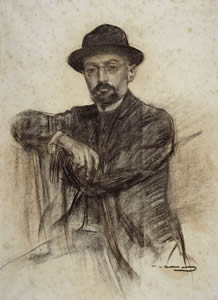
Miguel de Unamuno (29 september 1864 – 31 december 1936)
Portret door Ramon Casas
De Spaanse dichter en schrijver Miguel de Cervantes werd geboren op 29 september 1547 in Madrid. Zie ook mijn blog van 29 september 2010 en eveneens alle tags voor Miguel de Cervantes op dit blog.
Uit: Don Quichot van La Mancha (Bewerkt door J.J.A. Goeverneur)
“Toen de avond begon te vallen en Don Quichot zoowel als zijn knol van vermoeidheid en honger uitgeput waren, keek onze held naar alle kanten rond, of hij niet ergens een trots opstekenden ridderburcht of een gastvrij slot kon ontdekken, waar hij gelegenheid vond, om zijne behoeften te bevredigen en nachtrust te houden. Tot zijne blijdschap zag hij niet ver van zijn weg eene herberg staan, waarop hij aanreed en die hij, voordat het nog ten volle donker was, bereikte. Toevallig stonden voor de deur twee ganzenmeiden, die vroolijk met elkaar praatten en wier heldere stemmen hem reeds van verre in de ooren klonken.
Daar nu echter vriend Don Quichot alles, wat hem voorkwam, met de oogen van zijn verwarden geest zag en zich zoodoende de wonderlijkste dingen inbeeldde, zoo hield hij ook de herberg hier niet maar voor een gewone kroeg, maar meende in haar een echten en wezenlijken ridderburcht met torens en grachten, met wallen en ophaalbruggen voor zich te hebben. Toen hij er nog weinig passen van verwijderd was, bracht hij zijn paard tot staan en geloofde niets anders, of daar zou nu een dwerg op den torentrans verschijnen en door schetterend hoorngeschal verkondigen, dat een ridder door de burchtpoort verlangde toegelaten te worden. Tevergeefs wachtte hij eene poos, en Rocinante, die niet weinig naar den stal, naar voeder en rust verlangde, nam eindelijk de teugels tusschen de tanden en stapte bedaard op de deur van de herberg toe, zonder dat Don Quichot in staat was, het koppig dier tegen te houden. Voor de huisdeur bleef hij staan, en Don Quichot kreeg nu de beide morsige ganzenmeiden in het oog, welke zijne dolle verbeelding echter dadelijk in edele en hoogst bevallige jonkvrouwen herschiep, die zich voor de burchtpoort een weinig in de koele avondlucht vermeidden.
Terwijl hij haar nog vol eerbied aanzag, wilde het toeval, dat de varkenshoeder met zijne kudde van een stoppelland naar huis kwam en bij het bereiken van het dorp uit zijn horen eenige luide, krachtige tonen lokte. Nu geloofde Don Quichot wat zijne verbeelding hem had voorgespiegeld ten volle bewaarheid te zien; want hij hield den zwijnenhoeder voor den ontbrekenden dwerg en sprong vroolijk van het paard, om de beide schoone adellijke jonkvrouwen, dat wil zeggen de ganzenhoedsters, met eerbiedige buiging te begroeten.”
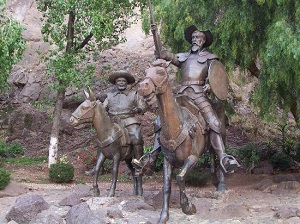
Miguel de Cervantes (29 september 1547 – 23 april 1616)
Standbeeld van Don Quichot en Sancho Panza in Guanajuato, Mexico
De Afghaanse schrijver en historicus Akram Assem werd geboren op 29 september 1965 in Kabul. Zie ook alle tags voor Akram Assem op dit blog.
Uit: The ‘1492’ Conspiracy
“We had dinner after all. We walked to a nearby restaurant named ‘The Two Hassans.’ As we walked in, loud Arabic music was playing. On a small stage, a belly dancer twisted like a snake, and on a larger dancing area some customers – male and female – tried to mimic her moves. A large sign hanging above the scene read ‘Arabian Nights Party; costumed clients get free drinks.’
Now, I understand why Necromonti and Shumington were sporting Jelebahs. These two bastards – I am sorry, these two gentlemen – had already planned their dinner out after grilling me and giving me ‘the world is in danger, you have to save it’ speech, making me lose my appetite – and probably my sleep, too – for the rest of my life, let alone thinking about getting free drinks and enjoying a theme night with belly-dancers on the deck.
“You may think that coming here is… inappropriate, isn’t it?” Shumington said. “And you’re probably right, somehow. But you’ve got to understand that we need to release the pressure that becomes rapidly overwhelming if we let it simmer. Too much pressure translates into over-stress, which is not good because it freezes your mind and handicaps your judgment.” He pointed thisout while knocking on his forehead.”

Akram Assem (Kabul, 29 september 1965)
De Britse schrijver Colin Dexter werd geboren op 29 september 1935 in Stamford, Lincolnshire. Zie ook alle tags voor Colin Dexter op dit blog.
Uit: The Jewel That Was Ours
“As the coach drew into St. Giles’, the sky was an open blue, and the sunlight gleamed on the cinnamon-coloured stone along the broad tree-lined avenue. “Here we are, in St. Giles.’ ” (Ashenden slipped into over-drive now.) “You can see the plane trees on either side of us, ablaze with the beautifully golden tints of autumn—and, on the left here, St. John’s College—and Balliol just beyond. And here in front of us, the famous Martyrs’ Memorial, modelled on the Eleanor Crosses of Edward the First, and designed by Gilbert Scott to honour the great Protestant martyrs—Cranmer and Latimer and, er …” “Nicholas Ridley,” supplied Mrs. Roscoe, as the coach turned right at the traffic lights and almost immediately pulled in on the left of Beaumont Street beneath the tall neo-Gothic façade of The Randolph Hotel. “At last!” cried Laura Stratton, with what might have been”
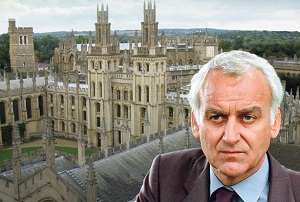
Colin Dexter (Stamford, 29 september 1935)
John Thaw als Inspector Morse (1987 – 2000)
Zie voor nog meer schrijvers van de 29e september ook mijn blog van 29 september 2013 deel 2.
